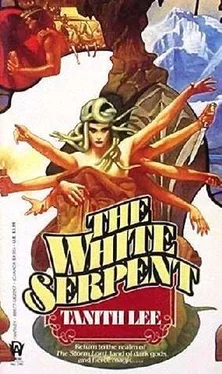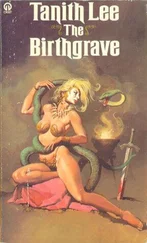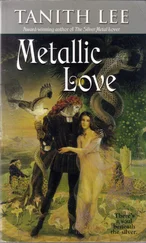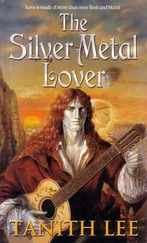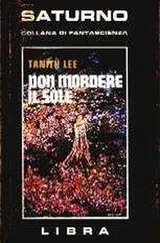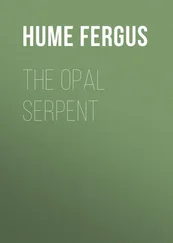Panduv crossed to her apartment, to see Teis put to bed. The sun was a red ball rolled almost all the way down the hill, and by its flushed glow the child lay on her mat giggling, as the nurse told her stories and tickled her. Panduv’s presence was noted by both and dismissed. Panduv stayed only a minute in the room.
She paced the roof terrace until the sun set. A religious stillness had descended on the city so that she heard a night bird begin to sing in a garden at the foot of the hill. The stars were sown. The evening was beautiful. The black woman stood high up in the sky on the priest’s roof, yearning for things forgotten or never known, until the breeze blew cold. She chided herself then, and went in again to the house.
There was a spring star which, a while before midnight, shone in through an upper window.
It woke Panduv, pointing down between her eyes. Or she thought it did.
She was aware immediately of a presence in the chamber, and stiffened, imagining snakes. But then it came to her the intrusion was not physical. Nothing was to be seen, or heard, yet, as if a voice had spoken in her head, she received the phrase: Go offer to Cah.
She was rebellious. Who tells me so?
In that moment she woke in earnest.
The apartment was undisturbed and silent and void, but for the dry chirrup of the cricket which dwelled behind the hearth stone.
Presently Panduv got up and drew on her mantle. She covered herself only with that. Leaving the bedchamber, she walked out into the passage, barefoot—
Starlit air hung from the window-places. At the corridor’s end, a flight of steps led into the altar-court.
On the house altar of Cah, freshly scrubbed and spilled with an aromatic, a dish of oil had been left burning for the festival. The drowsy flickering light showed only the lumpen stone of the goddess, faceless, and breastless, even. Yet it had been awarded a crown of flowers.
In her mind’s eye, Panduv saw herself, a dancer in a garland. She saw the Lydian wreathed after combat’s victory.
Although she was now awake, at least in part, another question welled through her, words she did not even understand. You want your hero’s glory back again? And, like the question not understood, a reply. Only to live.
The court, open to heaven, let starlight, too, in at the doorway of the guest’s cell.
He lay alone, motionless, but awake, she knew. He also had had his training. He could kill empty-handed if he judged her some thief or mischief-meddler.
“Hush,” she whispered, to let him recall her voice.
Then she heard him laugh, very low.
“This time,” he said, “it is Cah, coming through the shadow to me.”
Somnambulist, she kneeled down by him. It was dreamlike. As he reached out to her, her narrow hands slid about his neck.
Their mouths and bodies met recognizing some unnamed landfall, aphrodisiac as Zastis.
It was not only that he was Rehger—Saardsinmey—but that he was for her all regretted things. He had become not merely a young man, but her own youth, the male alter-demon of her flesh.
His hands found out her skin, her breasts, her thighs, as if, sightless, he must learn her by touch alone. When he possessed her, the strength of him was like the heart of fire. Always quiet in love or lust, she knew she must cry out. It would not matter, the house expected him to be with some girl. . . .
As the rhythm of the life-dance bore her up, she did not remember who he was. She did not know his name. She forgot she was Panduv.
Like a coiled flower of the chaplet of the goddess, (black Cah the Anackire-eyed), the pulse of her womb, the bud spreading its chalice, stretching to be filled.
She clung to him and he to her. The crying sang from her and she must smother her delight with her fist for fear it be heard—
The spring of liquid light pierced through her.
The flower-womb cupped and clasped and closed upon it.
Night and silence resettled like a fall of dust. In the silence, they were stilled together, saturated in the warmth of each other, and the starlight ticked across the floor.
“That was a welcome gift you gave me,” he said. “It’s a time of giving.”
When she moved to the mattress’ edge, pulling her mantle once more around her, he said sternly, “Will you be quite safe here? I don’t know what’s in store for me, but if—”
He stopped, and in the space she did not say anything more.
She saw the shine of the stars on his eyes as he watched her go, on his gentle, madman’s eyes. And out in the court, the wick was guttering before the goddess.
Panduv did not look back. She went up the stairs, along the passage, to her couch, and lay down there and slept at once.
About an hour and a half before dawn, fragmentedly, she discerned the noise of the yard gate, and knew that he had been let through, on to his unsure road, into his different future.
She woke again late in the morning, languid, not remembering. Then she thought it a dream, until the evidence of her own body put her wise. The craziness of what she had done thrust her mind forward in a senseless progression. Arud must suspect. He would cast her out into the streets and they would stone her there—such things went on, even in the sophisticated capital. Perhaps she should at once remove herself from the house. Why had she ever remained? How many occasions she had been on the point of an exit from this life. Something had stayed her. The child, maybe, or sentimental fondness for the paunchy priest who, by her wiles, she had so much changed, setting him at liberty also from the mores of masculine Iscah, to her benefit.
And she had grown comfortable. Her roots had gone down into this unsuitable soil. She bloomed here. She would not run away.
How should he know anything? Who had spied? The holy stillness of the night had been nearly uncanny, and in the hour of her excursion to the courtyard, the villa had seemed deserted, or its inhabitants under a spell—
She fell asleep again, and opened her eyes at last to a sound of brazen cymbals. It was the festival procession clashing over the afternoon.
A deep lassitude was on her, but she rose and went through certain bodily contortions now habitual with her after sexual union. For spring, the day had turned hot and heavy. She found her muscles intensely reluctant. She was debilitated, and left off.
There was the other way, to be sure. The herbs she had had the merchants fetch for her, the leaves of the plants she nurtured in her apartment. Their scent was pleasant, all but one. She gave for its excuse the pretty speckling of its leaves.
She brewed the drink in some distaste. The remedy was decided but unkind. There might be sickness, then she would bleed, which would not be to Arud’s liking, for, after the orgies of the temple, oddly, he was often hungry for her.
Well, it served her right. Since she had been so lavish with her greed and was now too lazy, and besides so very nervous. . . . For the Lan was not as young as her priest, therefore probably not as virile. Yet the single embrace—a burning—Best drink the herb. A day or two of malaise and Arud peeved would be a suitable penance and punishment for silliness.
The cup was ready. She held her breath against its smell, the actual look of it. And as she raised the goblet there in the afternoon storm-light—a terrible wailing cut through the sky.
It was a sound dehumanized, supernatural. It seemed to overpour the basin of the atmosphere and bring down the house.
She was in Saardsinmey, inside the pillar-drum, flung every way as heaven fell. The roar of crashing stone and of huge waters, the screaming of a single gargantuan throat.
Panduv spun about and the cup of abortion whirled from her fingers and the exquisite glass shattered on the tiles with the drink like lizard’s blood.
Читать дальше
